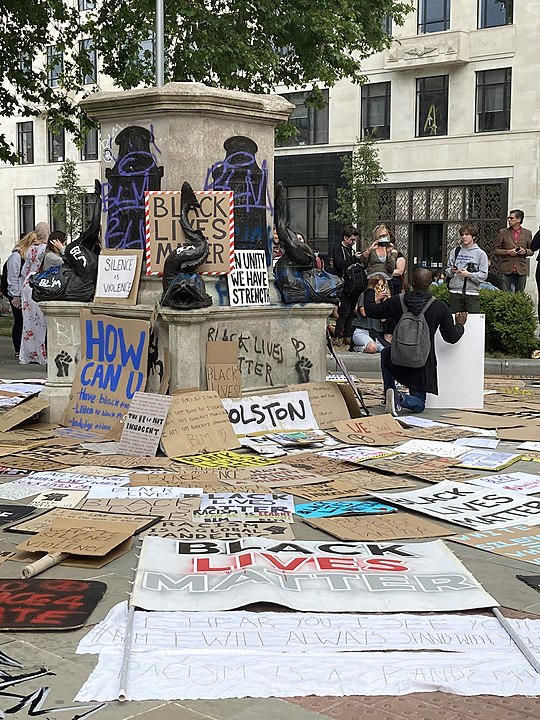Many people will find themselves somewhat emotionally torn by the sight of statues being toppled and defaced by angry, if self-appointed, modern iconoclasts.
On the one hand, George Floyd’s cruel murder has started a long-delayed and hugely needed confrontation by America with the reality of its shameful anti-black political, economic, penal and social discrimination and subjugation, a process that has sent ripples across the world.
Removing monuments to the Confederacy and its politicians that proliferate in America and ending the provocative use of their flag, is, I think, a justifiable symbolic reaction and expression of pent-up sense of injustice in relation to the cruel mass relegation of American blacks to second-class citizenship and social inferiority. The erection of those statues in the past and the use of those flags in the present represent an implied approbation, in some way, of the Confederacy’s legitimacy. For most black Americans, they connote white ambivalence about racial equality, given that the South fought for the retention of enslavement of American blacks.
On the other hand, the rictus of self-examination occurring in Britain raises questions as to how far a society can or should go in sanitising its public spaces and institutions of traces of its history that commemorate or even acknowledge Britain’s imperial past including British involvement in slavery.
The whole idea of empire, after all, is based on subjugation. Imperialists and the colonists have always clothed subjugation with the moral mantle of bringing civilisation and redemption. Rome gave the English its blessing on that account to subjugate and colonise Ireland.
Reading the excellent Handbook of the Irish Revival, edited by Kiberd and Mathews, I came across a piece written by my grandfather, Eoin MacNéill, in 1919 during the Irish war of independence which he passionately supported, describing imperialism:
“Imperialism is something more than the glory of dominating over lands and seas and subject peoples. To the pride of life, it adds the lust of the flesh and the lust of the eyes, the appetite for luxury and gain. Its pride, being contemplative, needs to be sustained by these active forces; and whenever you find the Imperialist spirit, you will find that it takes to itself a body made up of predatory feudalism and predatory capitalism, of oligarchies seeking to dominate the earth given to the millions to inhabit and the industry exerted by the millions to make the world inhabitable – in short, to enslave the world”.
That judgment has some relevance to the present British examination of conscience over racism. Toppling Edward Colston’s statue in Bristol or removing Cecil Rhode’s statue in Oxford is one thing; facing up to the fact that Britain, as a new political entity distinct from England, only evolved over three centuries into Great Britain by a sustained process of imperialism, involving enslavement, subjugation and colonisation, is another matter. MacNéill might well have added that one aspect of imperialist pride was a penchant for monumental self-glorification.
If all traces of its imperial past are to be carefully sanitised or removed or covered up to create space for a new inclusive British political narrative, a collective amnesia bordering on historical dementia will be needed. You simply can’t eradicate these traces and be true to history; they are woven into the tapestry of British history as permanently as the events of 1066 are woven into the Bayeux tapestry. By all means, it is open to every generation in any society to take its own view of its collective history and to interpret it anew. But it can’t be falsified or denied. Leaving the traces of history is qualitatively different from waving the Confederate flag in today’s America.
Any person wandering in Parliament Square will see statues of Churchill, Gandhi and Cromwell. A well informed Indian will look at Churchill and see a man who private despised the Indian people as a race and publicly argued for their continued subjugation in the British Empire. A well-informed Irish visitor will, at the very least, have deeply ambivalent views about both Churchill and Cromwell. A black South African might remember the racial prejudices of Gandhi in his younger days in South Africa – as might any lower caste Indian who remembers Gandhi’s earlier defence of the caste system.
Others might think that the three statues stand in that square as physical monuments to very divers figures from Britain’s imperial history which should cause no offence to reasonable British people of all colours and nationalities. They shouldn’t have to be boarded up – let alone be “defended” by a self-appointed gang of racist thugs.
I think the answer is more statues, not less. I don’t mind Price Albert lurking in the bushes at Leinster House, long after his wife was removed from there and transported, like her Young Irelander rebel felons, to Australia.
Perhaps, in Pride Week, Dublin might acknowledge the glaring truth that Roger Casement was gay and give him a decent statue to commemorate his struggles for Ireland, against imperialism, and for the cruelly enslaved people of the Congo and Amazon basins.

